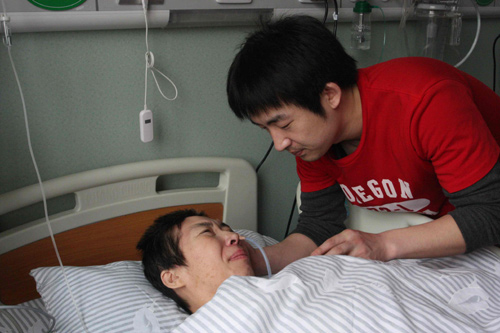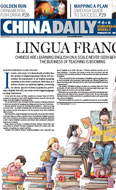From Chinese media
Man escorts ill mother home from abroad
Updated: 2011-02-25 21:14
By Zhu Chengpei and Zhang Xiaomin (China Daily Dalian Bureau)
|
 Li Chunhui looks after his mother Wu Zhen'ai at Dalian Central Hospital. [Photo/Piao Feng] |
DALIAN – Li Chunhui, a 26-year-old college student, sighed with relief, seeing his 49-year-old mother lying peacefully on a sickbed at a hospital in Dalian, Northeast China's Liaoning province.
Wu Zhen'ai, who has been in coma after a cerebral hemorrhage last May in South Korea, was transferred on Thursday from Seoul to Dalian Central Hospital.
On the way from Seoul to Dalian, Wu was carried on a stretcher and accompanied by an associate chief physician and head nurse of the department of neurology.
Seven years ago, when she went abroad to make money, the family never imagined that she would finish the journey in this way.
"I am heartily grateful to the people in Dalian. Without their help, it would be impossible for me to take my mother back," Li told China Daily.
Over the past two months, Li has made every effort to bring his mother back.
"We always say 'Fallen leaves return to the roots'. My mother was making money to buy a home for me in Dalian and she had decided to come back in 2011," Li said, choking. "I had never thought she wouldn't make the journey back home by herself."
According to Li, Wu had been doing odd jobs in Seoul for seven years before her cerebral artery popped on May 21, 2010.
Li was shocked when his father, who has been working there as construction worker since 1997, told him the news over the phone.
At the beginning of June 2010, Li flew to Seoul and saw his mother at an intensive care unit of a hospital as soon as he got the visa.
"I really wanted to tell her that I love her and I am grateful for what she did for me. But she could not understand what I was saying or even know who I am," Li said regretfully.
About 90 percent of the cells in Wu's right brain were dead. She had lost consciousness.
Li said if it were not for this accident, he would have never known about his parents' hard life abroad. He found out they were not "living the good life" as his mother always told him. Instead, they had lived in an underground room of only eight square meters.
Every month, the parents earn a combined total of about 16,000 yuan ($2,434). They had saved most of the money for their son to buy a home in Dalian until Wu’s health collapsed.
Li flew to South Korea immediately after he heard of his mother's accident and had kept vigil by her bedside day and night aside from returning to China every three months to renew his visa.
As his father has to continue at work to make ends meet, the family had to hire an attendant to take care of Wu during Li's absence, which was very costly for them.
Thinking of the problems and Wu's wish of returning home in 2011, Li decided to take his mother back to Dalian, a beautiful coastal city where Li had been living for more than 10 years. It was also the place the family from Northeast China's Jilin province was planning to settle down.
Many airlines refused to carry such a patient. At that time, Wu could only survive with a respiratory and feeding auxiliary system.
Only a Korean airline company agreed to sell tickets to Li, but they insisted his mother must be accompanied by doctors.
In an attempt to find willing doctors for the journey, Li turned to the Peninsula Morning Post, a local newspaper in Dalian. The paper published his story and succeeded in finding him voluntary assistance from the Dalian Central Hospital.
Local exit & entry administrative departments in Dalian also gave the green light.
"We want to do this to encourage the young man's filial piety," said Wang Suping, the chief physician of the department of neurology at Dalian Central Hospital.
Along with Peng Daoyong, the assistant chief physician, and nurse Zheng Shumin, Wu finally arrived in Dalian as planned and was still conscious. They were equipped with first-aid medicine and devices such as a respiratory assistance device and medicinal adrenaline.
According to Wang, Wu is now in an agrypnocoma. She can open her eyes and make some facial expressions, but she is unconscious. He said the hospital will try their best to treat his mother.
Man Wenfei, a journalist with the Peninsula Morning Post, first covered Li Chunhui's story and continued to follow it. He said the joint efforts of the relative institutions helped Li accomplish the journey.
"Li Chunhui's story is a reflection of the boomerang kid phenomenon, a social problem now in China with young jobless adults living off their parents. It's a touching story to see Wu finally arrive home, but at the same time, it shall ring an alarm for Li's alike. It is time for them to stand on both of their feet," Man said.
E-paper

Chinese tourists as top shoppers
Since last summer, Chinese tourists emerged as the top tax-free shoppers in Europe.
Golden run ahead
Looking abroad
Mapping out a plan
Specials

The green lantern
Environmental concerns are shedding new light on a colorful tradition

Inland interchange
Chongqing bets on its position as a hub for China's west.

Zooming in on Chinese skies
Helicopter companies ride on country's growing interest in luxury aviation.
